In a major multi-agency operation, U.S. Immigration and Customs Enforcement (ICE) arrested 17 illegal aliens at a construction site in Bethlehem, Pennsylvania on June 11. The worksite inspection, led by Homeland Security Investigations (HSI) Philadelphia with support from the FBI, IRS, DEA, and ATF, targeted a fire-damaged apartment complex known as Five 10 Flats.
The job site was undergoing restoration and had no tenants present, and employed workers contracted through a subcontractor. ICE served the employer with a Notice of Inspection—an audit of employee authorization documents—and immediately encountered multiple individuals working without legal status.
In total, 13 Venezuelans, two Mexicans, one Ecuadorian, and one Nicaraguan were administratively arrested for immigration violations. All are now in ICE custody pending removal proceedings.
“Ensuring worksite compliance is a fundamental responsibility of Homeland Security Investigations,” said Edward V. Owens, Special Agent in Charge of HSI Philadelphia. “Our commitment to safeguarding public safety, national security, and economic stability is unwavering.”
Owens stressed the importance of enforcing immigration law at job sites, especially as illegal employment undercuts American workers and opens the door to fraud and exploitation.
While no employers have been charged yet, ICE clarified that the investigation is ongoing and that businesses hiring unauthorized workers face serious legal exposure. Officials say the operation sends a strong message to unscrupulous contractors that illegal labor arrangements will not be tolerated.
Supporters of worksite enforcement argue that such crackdowns are essential to restoring the integrity of the U.S. labor market. Illegal employment is one of the primary magnets drawing foreign nationals to cross the border unlawfully. Removing that incentive, they argue, is a key component of any serious immigration strategy.
This week’s raid in Bethlehem is part of a broader push by ICE and its federal partners to hold both workers and employers accountable. With rising pressure on border security and labor markets, the administration’s renewed focus on interior enforcement shows that immigration law still matters—on the border and beyond.



